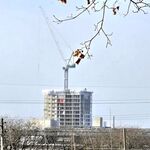And the BRT can then become a permanent solution as a cross City Centre to Malvern subway feeder.
It wont die. lol
This idea only lives in the hearts of a few here on UT and has been propelled by very ugly Downtown municipal politics which has now been completely removed from the decision making process. The line is actually far safer today then ever before and will continue to be as its fixed. From local municipal up to local federal the political support is beyond unanimous from every party in this massive suburb. But the fear mongering from the usual bunch will likely continue until the line is fixed and built.
Everyone is entitled to their own opinion but they aren’t entitled to their own facts. Leave it to coffey1 to pull complete bullshit out of his ass, again and again and again.
People like him that cannot, or purposely will not, see FACTS are a cancer on our democracy and provide fuel to the fire of populist demagogues that use base politics to appeal to idiotic voters. Then those people use bullshit smears like separating citizens in the same jurisdiction into “us” (Scarborough citizens) vs “them” (“Downtown elites”), or accuse those people interests in FACTS (I.e. Councillor Josh Matlow) as “fear mongers” or “in it just for political purposes”.
And then they make up this crazy paranoid delusion of a victim complex. “Everyone is out to get me”, “everyone hates Scarborough”, “Scarborough doesn’t they respect”, “subways subways subways”. It’s all such garbage. Read the goddamn manual of psychological disorders, this is Psychosis 101.
This is EXACTLY the modus operandi of Trump, Duterte, Bolsonaro, Putin, and yes, DOUG FORD.
And yes, it is EXACTLY the modus operandi of coffey1, the President Psychotic of this board, for years and years here, filling thousands of pages of this thread.
THE FACTS ARE that the SSE, either one stop or three stops or thirty stops, IS NOT justified according to current ridership patterns and established development in the pipeline, to justify the huge capital expenses (TAXPAYER DOLLARS).
THE FACTS ARE that other lines, like a SUBWAY Relief Line, have the clear established ridership and clear established development pipeline to justify the huge capita investment required.
THE FACTS ARE that all layers of government have limited resources available for capital expenditures like public transit lines, and so EVERY project CANNOT be simply a political exercise so a demigod politician get get votes. THEY MUST go through a rigorous, transparent, extensive and public business case analysis before their approval. The SSE, in ANY FORM, has NOT gone through a transparent and public analysis and instead has been co-opted purely for political purposes. That much is 100% clear.
Enough is enough is ENOUGH of the BULLSHIT!!




